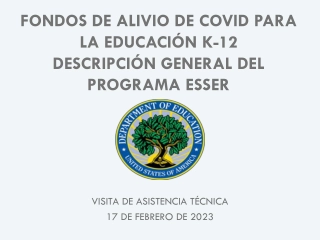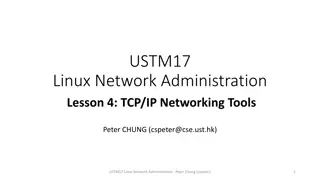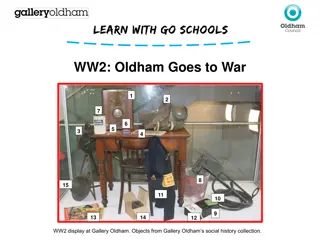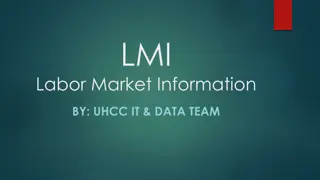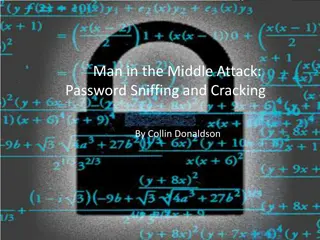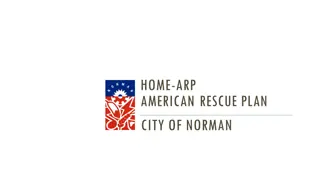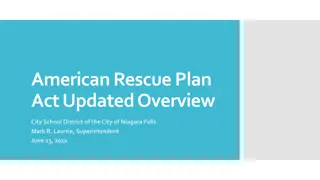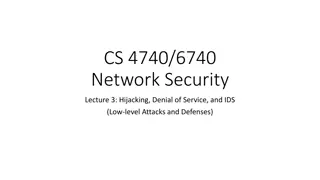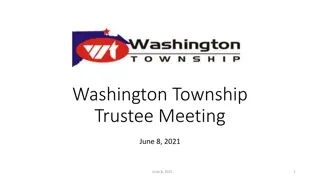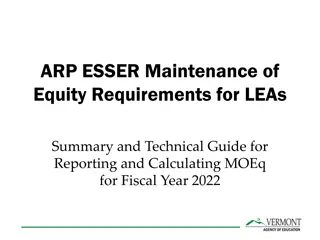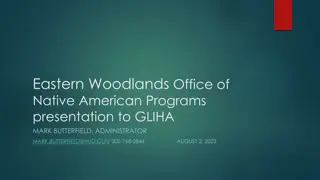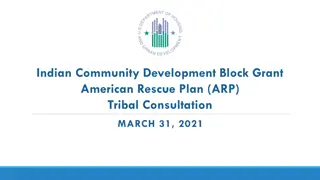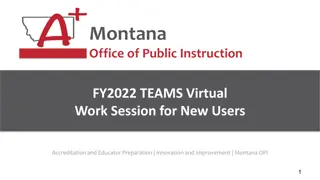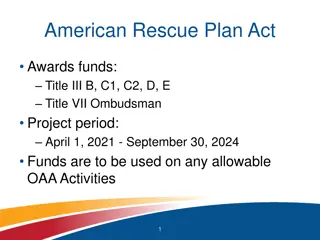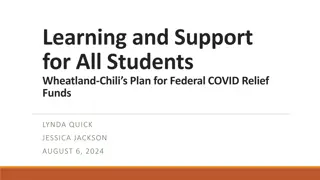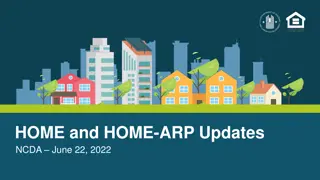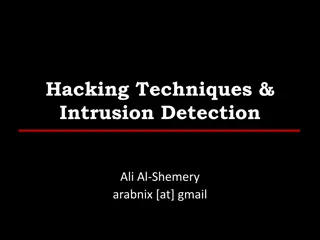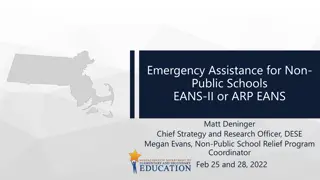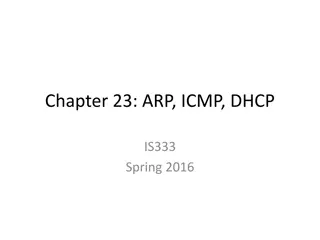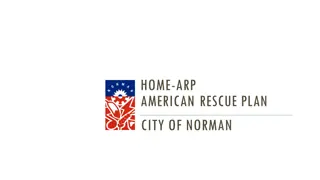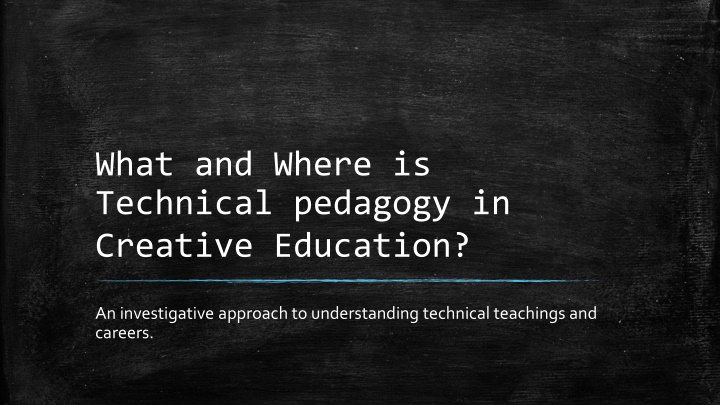
What AND where is Technical Pedagogy in Creative Education?
Explore the concept of technical pedagogy in creative education, focusing on rebranding, student learning approaches, staff development, innovation, and community teaching practices. Discover insights on breaking barriers for technical positions and opportunities in academia.
Download Presentation

Please find below an Image/Link to download the presentation.
The content on the website is provided AS IS for your information and personal use only. It may not be sold, licensed, or shared on other websites without obtaining consent from the author. If you encounter any issues during the download, it is possible that the publisher has removed the file from their server.
You are allowed to download the files provided on this website for personal or commercial use, subject to the condition that they are used lawfully. All files are the property of their respective owners.
The content on the website is provided AS IS for your information and personal use only. It may not be sold, licensed, or shared on other websites without obtaining consent from the author.
E N D
Presentation Transcript
What and Where is Technical pedagogy in Creative Education? An investigative approach to understanding technical teachings and careers.
Context: Technical Pedagogy. Rebranding of 'third space' pedagogy Built from a rhizomatic/scaffold approach to student learning Characterised by deliberate practice (demonstrative). Technical career pathways (Staff development/Innovation) Community teaching practice (Staff retention/Sustainability) Democratic leadership. (Staff Moral/ workplace engagement) This was particularly striking for activities such as designing lesson plans and course curricula, for which creative arts technicians were more than twice as likely to be involved. Wragg, Harris, Noyes and Vere 2022
Rationale: 'Broken windows' The reasoning behind this project is due to the barriers that are in place with technical positions and opportunities, even with the PgCert course, the focus is clearly on setting the Academic perspective and with lived experiences from staff and myself we are innovating achange to the system to gain respect and equal opportunity in the workplace. We are mainly valued by students constantly, but never from anyone else. The job of the technician is always backstage, as it should be, but it would be nice to be supported and valued. When I say valued, [that] means professionally valued, not just receiving the odd email saying well done to all . (Technician A) Clare Sams 2016 For technicians with aspirations to transition their own careers to academia the message of this study appears to be: excel as a technician; engage with professional development activities; earn the academic credentials on offer; collaborate with academic colleagues; and continue with your own practice and gain research insights Tim Savage 2018.
"UAL needs an academic workforce with the different skills to deliver teaching, research and knowledge exchange. The academic Career Pathways project is designed to recognise, develop and reward careers in these mission areas." Taken from the UAL Canvas Website: Academic career pathways.
Research methods Autoethnographic experiences Topical narrative extract Qualitative Research methods Focus group (live in person) Thematic analysis Forum/Survey Deductive codex Abductive future? Reflection trajectory
What are 'Third Space' Educators (TSEs)? "The shifting boundaries between academic and technical camps are under-researched. Arguably most relevant is Whitchurch s concept of a third space (2008) located between camps in which a new type of boundary-crossing hybrid HE worker resides. Figure 1 visualizes Whitchurch s third space as a Venn diagram. " Tim Savage 2018 Reflective Practitioner Instructional practitioner (online) Pracademic Tech-ademic Technical Tutor Studio Tutor Nurturing pracademics practice-informed teaching, professional values, networks and identities could realise myriad benefits for the in individual, the student experience and the HEI. Dickinson, Fowler and Griffiths 2020
The Focus Group / Post forum Democratic discussion Challenging third space pedagogy Empathy relation with other technical insights. Breaking down lvl4 job roles and responsibilities Relating job roles to teaching, KE or Research. Community discussion on the missing technical pillars. Forum to allow time to digest the conversation. 16 participants
The Forum: 10 participants out of 16 14 Questions, further carried on from the focus group. Section 1: Technical pedagogy. Section 2: Technical Career plans Range of multiple choice and long written answers. 'Other' Responses option to add to the research. Simple to complex structure.
Thematic Analysis: Deductive codex Code Description Evidence Under Under- -Valued Valued Tim Savage 2018 Deductive based on lived experiences as well as relating to literature evidence. Open to leading to abductive coding from gather evidence. Possibilities to explore other research methodologies. what I am looking for here, is evidence on staff feelings, job satisfaction and staff moral around the workplace. Opportunity Opportunity Dickinson, Fowler and Griffiths 2020 What I am looking for here, is evidence of technical staff having the opportunity to explore their practice, research or develop their skills within their own practice as well as teaching and learning. Third Third- -Space Space practitioners. practitioners. Tim Savage 2018 Whitchurch 2008 Vygotsky Wragg, Harris, Noyes and Vere 2022 what I am looking for here, is evidence that technical staff are teaching a wide variety of scenarios, 1-2-1 teaching, workshops, small group and large group etc. Practice and Practice and process process McLain 2017 Vygotsky What I am looking for here, is evidence that technical staff are developing a pedagogy or using a pedagogy around that is focused on process and practice of skill building and student knowledge development with critical thinking.
Thematic analysis: Findings Theme Evidence Conclusion Theme 1, shows that my research theme does provide evidence that technical staff are under- valued. Theme 1: Under Valued Theme 1: Under Valued (Staff feelings, Job (Staff feelings, Job Satisfaction, Staff morale) Satisfaction, Staff morale) Responses affirm the technicians' feelings of being treated as 'second- class' employees. The desire for more staff and recognition is also evident Theme 2, shows that there is a lack of opportunity for technical staff, as well as the need for external training/qualifications. Theme 2: Opportunity Theme 2: Opportunity (Technical staff (Technical staff development) development) Responses suggest interest in external teaching/training and upskilling in specific areas. Some responses highlight a lack of research opportunities and innovation. Theme 3, shows that majority of the technical teaching teams are third space practitioners. Theme 3: Third Space Theme 3: Third Space Practitioners (Teaching Practitioners (Teaching variety) variety) Responses showcase a variety of teaching scenarios, including technical workshops, supervised studios, and 1-1 teaching, aligning with the concept of Third Space Practitioners. Theme 4, shows evidence supporting that technical teaching and learning environments are based around practice and process. Theme 4: Practice and Theme 4: Practice and Process (Pedagogy, Skill Process (Pedagogy, Skill building, Critical thinking) building, Critical thinking) Responses provide detailed descriptions of teaching scenarios, emphasizing practical demonstrations, hands-on learning, and individualized guidance, supporting the focus on practice and process Deliberate practice is described as taking purposeful practice further, enhanced by proven techniques developed by experts, with a mentor figure playing an important role, providing real-time feedback, alongside the self-reflection (internal feedback) of the practitioner." McLain 2017 (Practice and Process)
Additional Themes found: Abductive future Additional themes Evidence Career Development and Satisfaction Discussions on areas of interest for career development, suggesting that career trajectory and job satisfaction are important concerns. Knowledge Exchange Responses emphasize the benefits of knowledge exchange, suggesting potential for collaboration, skill swaps, and fostering new ways of working. Research Opportunities Responses highlight the potential benefits of research opportunities for personal and departmental growth, innovation, and improved pedagogy. Participation in PG-cert Responses indicate mixed opinions on the PG-cert, with some considering it beneficial for personal knowledge and teaching approaches Focus Group Experience Responses express positive experiences with the focus group, indicating a desire for regular meet-ups and the need for continued communication among technicians.
Further Developing my ARP: Divide and Conquer Further Evidence methods: Theme Further evidence Conduct interviews or focus groups to delve deeper into the feelings of being undervalued. Ask open-ended questions about specific instances or experiences that contribute to this perception. Under Valued Under Valued Surveys: Develop targeted surveys with questions specifically designed to gather quantitative data on staff perceptions, experiences, and preferences related to each theme. Interviews: Conduct in-depth interviews to allow staff to express their thoughts, experiences, and opinions more elaborately, providing rich qualitative data. Focus Groups: Organise focus groups with a diverse representation of technical staff to encourage open discussions and the sharing of varied perspectives. Document Analysis: Analyse relevant documents, such as official reports, meeting minutes, or departmental communications, to identify any implicit or explicit mentions of the themes. Observations: Personally observe teaching sessions, workshops, or other activities to gain insights into the daily practices and challenges faced by technical staff. Explore staff turnover rates, absenteeism, or any available data that might indicate dissatisfaction among technical staff. Create a survey to gather detailed responses on the specific opportunities technical staff desire, such as access to training programs, involvement in research projects, or exposure to innovative practices. Opportunity Opportunity Conduct one-on-one interviews to understand individual aspirations and expectations for career development. Observe or shadow technical staff during their teaching activities to gain firsthand insights into the variety of scenarios they handle. Third Space Third Space Practitioners Practitioners Conduct interviews to explore the challenges and benefits of teaching in different scenarios, and how it aligns with the concept of Third Space Practitioners. Examine course materials, syllabi, and teaching plans to understand how technical staff integrate practice and process into their teaching methodologies. Practice and Practice and Process Process Conduct in-depth interviews or focus groups to explore the pedagogical approaches employed by technical staff and their perceptions of the effectiveness of these methods.
Whats Next: Tech Talks and Hot Press HOT PRESS TECH TALKS Better posters soon Thank you, Sean-Henry Fitzsimons Hybrid practitioner (lost between two worlds).
References Advance HE (2018). Technicians: Fellowship as a stepping stone to academia | Advance HE. [online] www.advance-he.ac.uk. Available at: https://www.advance- he.ac.uk/news-and-views/Technicians-Fellowship-as-a-stepping-stone-to-academia [Accessed 12 Jan. 2024]. Blair, E. and Briggs, G. (2019). A tribe hidden in plain sight: the ambiguous role of the instructor in a Caribbean university. Journal of Higher Education Policy and Management, 41(3), pp.292 305. doi:https://doi.org/10.1080/1360080x.2019.1596388. Bryman, A. (2007). Effective leadership in higher education: a literature review. Studies in Higher Education, 32(6), pp.693 710. doi:https://doi.org/10.1080/03075070701685114. Dickinson, J., Fowler, A. and Griffiths, T.-L. (2020). Pracademics? Exploring transitions and professional identities in higher education. Studies in Higher Education, 47(2), pp.1 15. doi:https://doi.org/10.1080/03075079.2020.1744123. Grocott, L., McEntee, K., Coleman, K. and Manix, R. (2019). The becoming of a designer: An affective pedagogical approach to modelling and scaffolding risk- taking. Art, Design & Communication in Higher Education, 18(1), pp.99 112. doi:https://doi.org/10.1386/adch.18.1.99_1. Hahn Tapper, A.J. (2013). A Pedagogy of Social Justice Education: Social Identity Theory, Intersectionality, and Empowerment. Conflict Resolution Quarterly, 30(4), pp.411 445. doi:https://doi.org/10.1002/crq.21072. McLain, M. (2017). Emerging perspectives on the demonstration as a signature pedagogy in design and technology education. International Journal of Technology and Design Education, 28(4), pp.985 1000. doi:https://doi.org/10.1007/s10798-017-9425-0. McLain, M. (2019). Developing perspectives on the demonstration as a signature pedagogy in design and technology education.International Journal of Technology and Design Education, 3(26). doi:https://doi.org/10.1007/s10798-019-09545-1.
References continued Spark: UAL Creative Teaching and Learning Journal How do art and design technicians conceive of their role in higher education? Artist (formerly a Technician at Central St Martins). Spark: UAL Creative Teaching and Learning Journal, 1(2), pp.62 69. Savage, T. (2018). Creative arts technicians in academia: To transition or not to transition? Art, Design & Communication in Higher Education, 17(2), pp.237 253. doi:https://doi.org/10.1386/adch.17.2.237_1. Savage, T. (2019). Challenging HEA Fellowship: Why should technicians in creative arts HE be drawn into teaching? Art, Design & Communication in Higher Education, 18(2), pp.201 218. doi:https://doi.org/10.1386/adch_00007_1. Stommel, J. (2018). Radical Openness: the Work of Critical Digital Pedagogy. [online] www.slideshare.net. Available at: https://www.slideshare.net/jessestommel/radical-openness-the-work-of-critical-digital-pedagogy [Accessed 12 Jan. 2024]. University of the Arts London and Corrall, S. (2017). CAREER PATHWAYS -DISCUSSION DOCUMENT Academic Career Pathways Project. The Exchange. Wragg, H., Harris, C., Noyes, A. and Vere, K.-A. (2023). Technicians as teachers: the emerging role of technical staff within higher education teaching and learning environments. Journal of Further and Higher Education, 47(9), pp.1 15. doi:https://doi.org/10.1080/0309877x.2023.2231380. Yosief, A., Sulieman, M.-S. and Biede, T. (2022). Improving the practices of teacher educators through collaborative action research: challenges and hopes. Educational Action Research, pp.1 18. doi:https://doi.org/10.1080/09650792.2022.2066147. Zhao, F., Liang, S., Ma, J. and Ou, Q. (2023). Research on the innovation of teaching mode of vocational and technical education. SHS web of conferences, 166, pp.01078 01078. doi:https://doi.org/10.1051/shsconf/202316601078.

